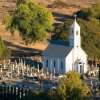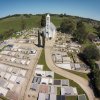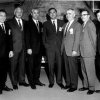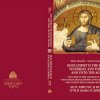- GRAVEYARD web-page
- MAP of the cemetery (pdf 2.4 MB)
St. Sava Church in Jackson, California, is recognized as the first consecrated Serbian Orthodox Church and cemetery on the North American continent. Serbian miners and their families were drawn to the Mother Lode and Amador County during the California Gold Rush 1849 seeking fortune and a new life. They would later found the parish in 1894.
In the mid 1860s the number of Serbian Orthodox in the area had grown significantly. In 1886 they formed the St. Sava Benevolent Society and purchased an acre of land on North Main Street in Jackson for a cemetery. This land was used as a cemetery for the Serbian people.
Meanwhile in San Francisco, the young Sebastian Dabovich (born Jovan Dabovich), an American born of Serbian parents, was ordained to the priesthood by the local Russian Orthodox bishop. Father Sebastian often journeyed to Jackson to baptize children and perform marriages. In 1893 he urged the faithful to organize and build a Church. Within one year, the building was complete. Bishop Nikolai of Aleutians and Alaska officiated at the consecration of the temple. The Russians donated the bell for the church which was cast in Jackson. It still peals in the belfry today.
The construction of Saint Sava Church was started in 1894 and consecrated later that year on December 4. The oldest headstones are located behind the church. In 1877, two boys from the Dragomanoich family were the first burial, 17 years before construction of the church. These early graves give testimony to the first Serbian immigrants who came from Herzegovina, Boka and Montenegro. To the left of the front of the church are buried 11 miners who tragically lost their lives in the Argonaut (Gold) Mine Disaster in 1922.According to the parish records from 2014 which came from the cemetery office, there are 417 graves. Many are family graves with more than one person buried within.
There are several graves of Orthodox Americans of recent times who were a part of the Saint Sava Liturgical community of Jackson.
With the decision of His Grace Bishop Chrisostom of Zicha and with the initiative of the Jackson clergy and parishioners along with help from Bishop Maxim, the earthly remains of Father Sebastian were transferred from Zicha Monastery into Saint Sava Church in Jackson during the summer of 2007.
Part of this text is taken from the “Annual 2013” (Sebastian Press 2013)
The History of the Western American Diocese
Serbian Orthodox Church in North America






